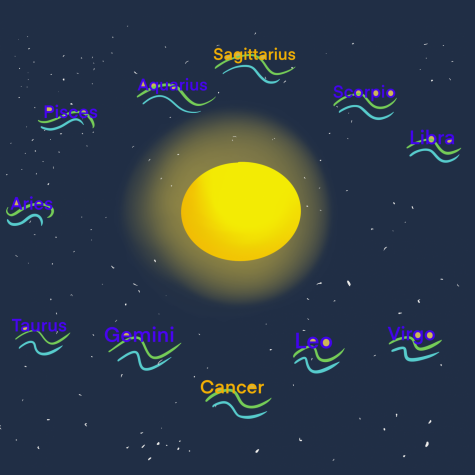Students reaches meaning behind zodiac signs

Every time I went to the grocery store as a kid I would stay in the magazine section reading “Girls Life” and “Teen Beat” while my mom did all the boring grocery stuff. I would sit down in the middle of the aisle like I own the place and immediately turn to the quiz section to find which celebrity I belonged with, (not to brag, but I got Justin Bieber 9/10 times). As I was flipping through one day I came across the “horoscope section.” Not knowing what it was at the time, I just read every description and picked which sign fit me best, blind to the fact that zodiac signs are based on your birthday and the alignment of the stars. Learning this made me question how accurate these descriptions really were. According to a study by Columbia University 30% of Americans believe in Astrology. That 30% must be largely taken up by Gen Z because I can’t get on Tiktok without a video about how awful cancer men are, or how the Geminis color is sage green. Social media has embraced the zodiac sign in full force, Snapchat even requires users to put in their birthday to depict their sign for all users to see. It’s important to understand how society got to the point where looking at stars was a way to find out who you are and realizing what astrology really has to offer.
Many historians have pondered when this idea of looking towards the stars to predict the future, began. According to American astronomer Sten Odenwald, some forms of astrology show up in various belief systems in ancient cultures. For example, in ancient China, noblemen looked at eclipses or sunspots, as portents of good or bad times for their emperor. When looking further into history, the use of astrology was recognized for the first time in the second millennium B.C. with the Sumerians and the Babylonians. For them, astrology wasn’t so much about “what couch should be in your house due to your zodiac sign” like Buzzfeed would have you believe. Instead keeping track of the planets and stars was a way to follow their gods, which they could follow with “The Venus tablet of Ammisaduqa.” The question is, how did tracking the stars to keep up with gods or predict if it would be a good year as a whole, turn into a 21st-century phenomenon in which teens all over the world determine what drink at Starbucks fits them the best based on their birthday.
As NASA suggests to imagine a straight line drawn from Earth through the sun and out into space way beyond our solar system where the stars are. Then imagine Earth following its orbit around the sun. This imaginary line would rotate, pointing to different stars throughout one complete trip around the sun, or one year. All the stars that lie close to this imaginary flat disk swept out by this imaginary line are said to be the zodiac. So essentially what this means is that depending on your birthday and the position of the earth on its rotation (which is the same every year, obviously) we determine our zodiac sign. The Babylonians already divided the zodiac into 12 equal parts by 1500 BC and even given names similar to today such as “The Great Twins” which we know as Geminis, or “The Lion” known today as the Leo. Astronomer Ptolemy, the author of Tetrabiblos, became a core book in the history of western astrology and helped popularize these 12 zodiac signs.
Now let’s look up to the stars to understand the harms and benefits of the zodiac craze. Since Ptolemy’s time, we have only seen the rise in the popularity of astrology. From apps such as Co-star and Astrology Zone taking effect on many Gen Zers Home Screen. The app asks users for detailed biographical information to develop an accurate natal chart, which is an “astronomical snapshot of the sky based on the exact day, time, and place you were born,” according to the copy on the app’s website. The problem that I see with these apps is that we don’t really know where these descriptions come from or how they relate to the stars. For instance today, March 8th, my Co-Star told me “Your journey is all about growing into a new human, again and again.” Then processed to tell me my dos and don’ts, “Do: Spontaneity, Winding roads, Spanish moss. Don’t: Waxwings, Specious arguments, lofty ideas.” Besides the fact that none of that makes sense in the first place, it also doesn’t make sense in relation to my astrological sign at all. Where these apps fail is by connecting your astrological profile to the advice that it gives. I wouldn’t be surprised if it was just randomly assigned to you every day. This wouldn’t be a problem except for the fact that people all over the world believe in these signs and these fortunes. If it told them not to talk to a “Virgo man” that day they would listen without question. Though I love having something to believe in, and the history behind them is super cool, I believe we aren’t using them the way they are intended to be used. After all, they were meant to follow the gods, now we use them to tell us what junk food we are based on our sign.